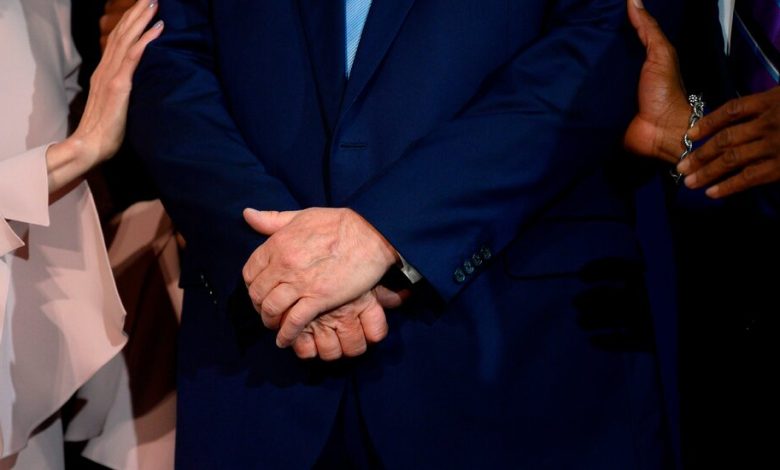MAGA Has Devoured American Evangelicalism

Tim Alberta’s recent book about the Christian nationalist takeover of American evangelicalism, “The Kingdom, the Power, and the Glory,” is full of preachers and activists on the religious right expressing sheepish second thoughts about their prostration before Donald Trump. Robert Jeffress, the senior pastor at First Baptist Dallas — whom Texas Monthly once called “Trump’s Apostle” for his slavish Trump boosterism — admitted to Alberta in 2021 that turning himself into a politician’s theological hype man may have compromised his spiritual mission. “I had that internal conversation with myself — and I guess with God, too — about, you know, when do you cross the line?” he said, allowing that the line had, “perhaps,” been crossed.
Such qualms grew more vocal after voter revulsion toward MAGA candidates cost Republicans their prophesied red wave in 2022. Mike Evans, a former member of Trump’s evangelical advisory board, described, in an essay he sent to The Washington Post, leaving a Trump rally “in tears because I saw Bible believers glorifying Donald Trump like he was an idol.” Tony Perkins, president of the Family Research Council, enthused to Alberta about the way Trump had punched “the bully that had been pushing evangelicals around,” by which he presumably meant American liberals. But, Perkins said, “The challenge is, he went a little too far. He had too much of an edge sometimes.” Perkins was clearly rooting for Ron DeSantis, who represented the shining hope of a post-Trump religious right.
But there’s not going to be a post-Trump religious right — at least, not anytime soon. Evangelical leaders who started their alliance with Trump on a transactional basis, then grew giddy with their proximity to power, have now seen MAGA devour their movement whole.
Absent the sort of miracle that would make me reconsider my own lifelong atheism, Trump is going to win Iowa’s caucuses on Monday; the only real question is by how much. Iowa tends to give its imprimatur to the Republican candidate who most connects with religious conservatives: George W. Bush in 2000 and 2004, Mike Huckabee in 2008, Rick Santorum in 2012, Ted Cruz in 2016. But this year, according to FiveThirtyEight’s polling average, Trump leads his nearest Republican rivals by more than 30 points.
“People think it’s all a good-and-evil election,” and therefore “we need a strongman — that it’s so serious we can’t play around anymore with a nice guy,” Tim Lubinus, executive director of Iowa’s Baptist convention, told The New Yorker’s Benjamin Wallace-Wells.
Like many influential evangelicals in Iowa, Lubinus wants to see an alternative to Trump. So does Bob Vander Plaats, the head of a Christian activist group called the Family Leader, until recently was seen as a kingmaker in the state. He’s endorsed Ron DeSantis, as has the evangelical Iowa talk show host Steve Deace. (Iowa’s culture-warring governor, Kim Reynolds, has also endorsed DeSantis; she recently used a private social media account to contrast a photo of him and his wholesome family with a picture of Trump surrounded by glamorous women at a New Year’s Eve party.) Vander Plaats has been particularly critical of Trump for suggesting that Florida’s six-week abortion ban is “too harsh.”
But if the polls are right, Iowa’s evangelicals don’t care what their ostensible leaders think. Trump’s rise been accompanied by a collapse in trust in many American institutions once valued by the right, including the F.B.I. and the military, and that loss of faith extends to many religious authorities. As Alberta, the son of a conservative evangelical pastor, documented, preachers who’ve balked at parts of the MAGA agenda have been abandoned by many of their congregants.
“The forces of political identity and nationalist idolatry — long latent, now fully unleashed in the form of Trumpism — were destroying the evangelical church,” wrote Alberta in his book. All over the country, he reported, “pastors had walked away from the ministry. Congregations had been shattered by infighting. Collective faith communities and individual relationships had been wrecked.”
From this wreckage has emerged a version of evangelicalism that sometimes seems like a brand-new religion, with Trump at the center of it. As Ruth Graham and Charles Homans reported in The New York Times this week, in Iowa, the percentage of people tied to a congregation fell by almost 13 percent from 2010to 2020, one of the sharpest declines in the country. “As ties to church communities have weakened, the church leaders who once rallied the faithful behind causes and candidates have lost influence,” they wrote. “A new class of thought leaders has filled the gap: social media personalities and podcasters, once-fringe prophetic preachers and politicians.” Trump captured the spirit of this movement when he shared a video on his Truth Social site titled, “God Made Trump.”
There’s no way to know if evangelical leaders could have prevented this devolution of their faith by joining together to stand up to Trump before he became such a mythic figure. But now, more than seven years into their deal with the devil, it’s probably too late.
The power of Christian-right operatives like Vander Plaats came from their ability to move their followers, but Trump has taken that power away from them, absorbing it into himself. Vander Plaats has been reduced to arguing, as he did in a Des Moines Register essay this week, that Iowans should choose DeSantis because it would position him to protect Trump from his persecutors. “A DeSantis presidency ensures justice for Trump,” Vander Plaats wrote.
Those convinced that Trump is touched by divinity, however, are unlikely to think he needs another politician to shield him. “I think they are doing the same thing they did to Jesus on the cross,” one Christian voter told The Associated Press, speaking of Trump’s manifold legal troubles. It doesn’t matter what evangelical elites say. Trump’s acolytes want to see him rise again.
The Times is committed to publishing a diversity of letters to the editor. We’d like to hear what you think about this or any of our articles. Here are some tips. And here’s our email: [email protected].
Follow the New York Times Opinion section on Facebook, Instagram, TikTok, X and Threads.



